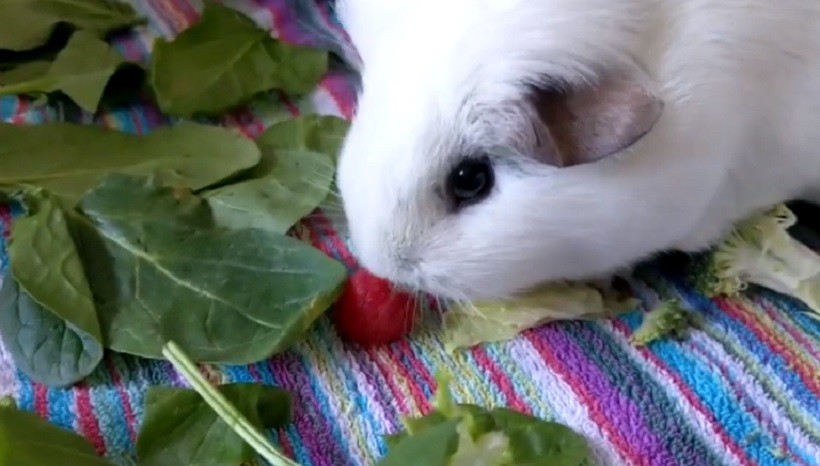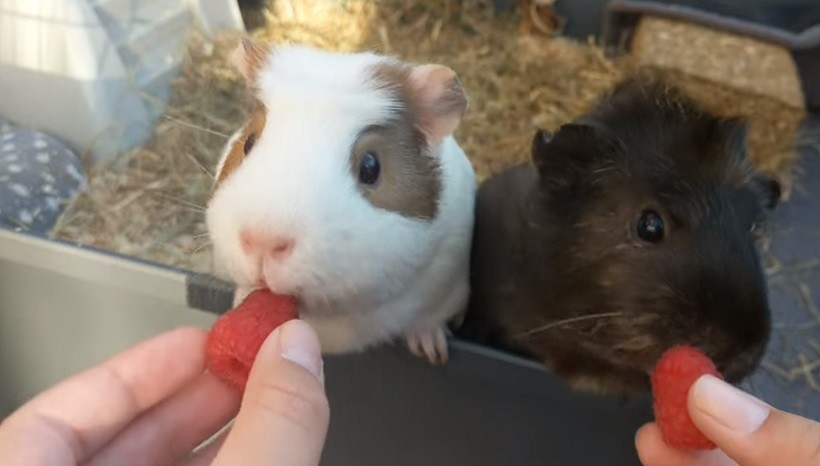Guinea pigs are allowed to eat raspberries in a controlled way. Raspberries contain elements like vitamin C and fiber, which are good for the health of your pet. But they also have some harmful minerals and sugar, which are better to avoid.
Vitamin C is needed by guinea pigs for various functions and fighting against scurvy. The same is the case with fiber. However, excess sugar consumption is bad for the health of these little rodents. Therefore, you can give raspberries to them, but in a moderate quantity.
Nutritional Facts Of Raspberries
Let’s take a sample of 50 grams of raspberries. It has the following nutrients:
How To Serve Raspberries To Guinea Pigs?
Do not give the raspberry to your guinea pig daily. You can treat it with this fruit either once or twice a week. Try giving different fruits and vegetables to it throughout the week. Also, do not feed a large amount of raspberry to piggy at once. One to two pieces of this fruit is enough at a time.
If you serve this fruit keeping all the precautionary measures in mind, then it is a healthy diet for guinea pigs. Otherwise, it is more harmful instead of beneficial to them.
Health Benefits Of Raspberries

Raspberries are loaded with essential nutrients. Some of them are calcium, phosphorus, vitamin C, and iron.
There are several health benefits of eating raspberries for guinea pigs, which includes:
Anti-inflammation
Raspberries are loaded with multiple anti-inflammation compounds. This is particularly helpful in fighting against diseases that cause inflammation.
Raspberries contain antioxidants. They have a primary function to repress free radicals. Free radicals promote inflammation inside the body. Antioxidants also lessen the risk of chronic diseases for these little rodents.
Fiber
There is a large amount of fiber that comes with raspberries. Fiber is essential for guinea pigs and it is preferred to include it in their diet. Primary roles of fiber include assisting the digestive tract of guinea pigs and maintaining their gastrointestinal health. Fiber also helps them to avoid the overgrowth of their teeth.
Vitamins
Different vitamins including vitamin C, E, and K can be consumed by raspberries. Vitamins are needed by guinea pigs to strengthen the immune system and for the healing of wounds. In addition to this, for the proper growth and maintenance of their skin, muscles, etc they need vitamins. Protection from different diseases also depends on vitamins.
Cardiovascular System
Raspberries also play their part in maintaining the cardiovascular health of guinea pigs. Raspberries are very low in fat which keeps blood vessels unclogged. They have potassium which regulates blood pressure. So, it is safe to say that raspberries are important for the healthy heart of guinea pigs.
Hydration
As raspberries also have water in them, they are good for guinea pigs to keep them hydrated in hot climates. Water is a necessary component of their diet.
Iron And Copper
Iron and copper are the common elements of raspberries. They are necessary for healthy blood. So, pigs are unlikely to become ill with anemia.
Risks Of Raspberries
Here are some problems which can arise if an excess amount of raspberries has been consumed by guinea pigs:
Urinary Problems
Raspberries have calcium. Calcium is very important for young guinea pigs. But adult ones need it only in a limited quantity. Otherwise, it can be harmful to their health. If adult guinea pigs consume more than the needed amount of raspberries, consequently they consume excess calcium. This can lead to stone origination in the bladder or kidney. These problems if neglected can be proved fatal.
Digestive Problems
Too much consumption of fiber and sugar can cause different digestive problems. Gastrointestinal pain is one of them. Also, your pet might suffer from gas, cramps, etc.
Hyperglycemia
Hyperglycemia is a disease that is caused by an excessive intake of sugar. Since raspberries also contain sugar. They can cause this disease too if taken in surplus amounts. In this disease, your pet would suffer from very low blood sugar levels. It can also lead to weight loss.
Diabetes
Although this disease is very rare in guinea pigs. They can still suffer from diabetes. If they are fed on a lot of sugary foods. As raspberries also contain a considerable amount of sugar, be careful when feeding this to your pet.
Risk Of Weight Gain
Just like diabetes, excess intake of sugar can also lead to weight gain in guinea pigs. Gaining extra weight is not preferable for them. It is because this could eventually kill them.
Although there are not many chances of your pet gaining weight because of raspberries. But, it might happen as this fruit contains carbs and sugar.
Pesticides
Raspberries are not free of pesticides. EWG has confirmed that this fruit is loaded with pesticides. If guinea pigs are fed with pesticides daily, they could suffer from cancer. Cancer is a fatal disease. Therefore, be careful when feeding raspberries to guinea pigs.
Do Guinea Pigs Like Raspberries?

No one can tell with 100% certainty whether your little pet likes to eat raspberries or not. But the general observation tells us that most guinea pigs like to eat raspberries. This fruit is sweet. That’s why pigs prefer them. However, even if your pets like to eat it, you can treat them with this occasionally.
It could also happen that you see your pet not liking raspberries at all. This is because their taste varies individually. Every one of them is unique and has its preferences.
Make sure that raspberries are not easily accessible to them when they roam freely. They cannot resist eating it if they like it. This can create many problems for them.
What About Raspberry Leaves?
Raspberry leaves are not only edible but also safe for guinea pigs. These leaves do not contain sugar or any other harmful component. They are rich in essential nutrients. Raspberry leaves are a perfect choice for your pig.
However, wash these leaves before giving them to your pet. There is a high chance that there are some pesticides sprayed on it. Therefore, I must rinse it to avoid any trouble.
Is Raspberry Juice Safe For Guinea Pigs?
No, raspberry juice is not good at all for guinea pigs. It has much more sugar than the fruit itself. Intake of too much sugar is harmful to piggies. Therefore, it doesn’t seem a good idea to make your pet drink raspberry juice.
Also, when we extract the juice of the fruit, all the essential nutrients get eradicated from it. So, one should only stick to the fruit for guinea pigs.
Are Frozen Raspberries Good For Guinea Pigs?
You can give frozen raspberries to your guinea pig. But you need to bring it to room temperature first. Otherwise, your pet can suffer from complex difficulties like digestive ones.
You further need to consider the fact that when fruits are being frozen they lose some of their essential nutrients. So, it is more advisable if you give fresh raspberries to piggies.
Can You Serve Dried Raspberries To Guinea Pigs?
Dried raspberries have much more sugar content than fresh ones. They are five times more sugary than commercial raspberries. Because of this experts advise not to give it to your little pets. It is to evade diseases caused due to the excessive intake of sugar.
Are Canned Raspberries Bad For Guinea Pigs?
Yes, canned raspberries are very bad for guinea pig’s health. To increase the life of canned foods including canned raspberries, certain preservatives are added to them. Moreover, they have extra sugar and salt. Artificial color is also present in them. All these elements are harmful to your pig. That’s why avoid giving canned raspberries to your pet.
Are Raspberries Safe For Baby Guinea Pigs?
You should wait for at least 6 weeks after the guinea pig’s birth. After that, introduce it to this raspberries snack. Piggies older than 6 weeks can safely enjoy this fruit. However, pigs younger than 6 weeks should not be given such fruits. It is because they are too small at that time to easily digest fruits.
If you want to learn more about pets visit us at petshoods
Are Guinea Pigs Allowed To Eat Red Raspberries?
Yes, guinea pigs are allowed to eat red raspberries. These red raspberries are a commercialized type of raspberries. But just like other raspberries, guinea pigs can only eat them in moderation. Red raspberries have some very useful nutrients like vitamins. But at the same time, they have calcium, carbs, and sugar too. That’s why pigs can’t eat them in abundance.
Conclusion
Raspberries are safe for guinea pigs only if they are served to them in moderation. There are many health benefits of eating this fruit. However, excess consumption also leads to different problems. These piggies also like to eat this fruit in general. Raspberry leaves are also edible for them. While they should not drink raspberry juice.
Canned raspberries are also dangerous for guinea pigs. The same are dried raspberries. Frozen raspberries can be given to them. But this is not advisable. Only guinea pigs that are older than 6 weeks should be provided with this fruit.